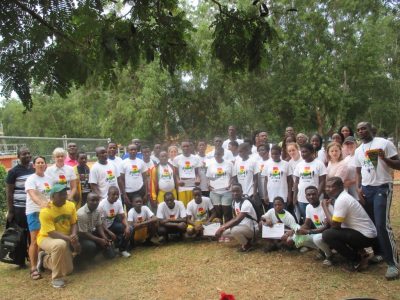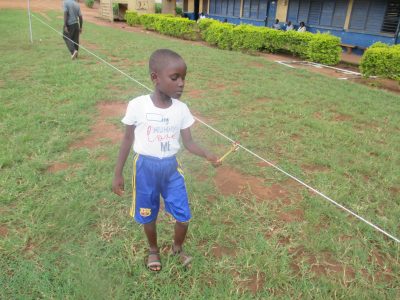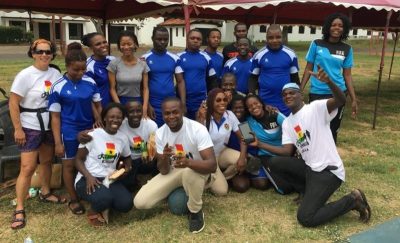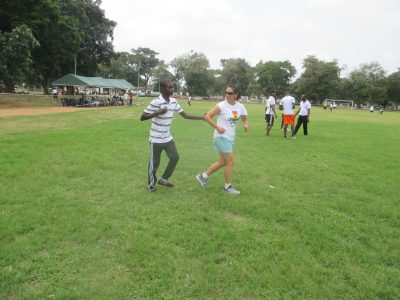By Lauren Lieberman.
Ghana: Where Are The Kids?
Accra, Ghana: August 2019
Having been awarded the US State Department’s Fulbright Global Scholar Award, I began my journey in Ghana. After a trip of over five thousand miles, I arrived in Accra on August 9, 2019. What you notice first is the heat, a wet blanket you have to carry with you everywhere. The next thing you notice is the traffic. It’s unlike any city in America. The roads are narrow, the horns are loud. Motorcycles weave in an out of the cars, barely missing bumpers. People walk or bike from car to car selling you anything you could ever need. It was a Ghana-style drive-through. I knew right away I was about to have an adventure.
Among Ghana’s 28 million citizens, over four million are children who are blind, visually impaired or deafblind. Unlike children who are visually impaired in the US, these children are not included in local schools and sports programs. My goal was to teach the Ghanaians how to organize and run a Camp Abilities. But, unlike the US, Ghana does not have a camp culture. “Going to camp” is an unknown concept.
Going to Camp
I was excited to begin working with Dr. Reggie O’Cansey at the University of Ghana to host a Camp Abilities from August 26-30. We had two weeks to fine-tune.
Selecting a date is easy. Running a camp is not. When I stepped off the plane, I was dismayed to discover nothing had been planned or organized. No facilities. No coaches. No meals. We didn’t even know where the kids were located.
Ghana has several schools for children with intellectual disabilities and the Deaf. However, there are only three dedicated to the educational and social needs of children who are blind. None of these children were near Accra and the University of Ghana.
I was in a foreign country within a different culture. I had no phone and limited resources. And, to complicate matters further, the primary language of Ghana is English. However, there are over 130 different spoken languages. I had to get creative to speak with people whose primary language was Twi or Ga. Camp Abilities motto is Believe and You Can Achieve. I had to embrace that motto.
Our first step was to find campers. We drove high into the mountains (twice!), we held radio interviews, we visited the Department of Education. We basically went door-to-door.
We sent invitations, organized staff, made calls, arranged equipment and facilities, ordered t-shirts. We recruited Paralympic athletes. I got food poisoning. I got attacked by fire ants. But I also met educators and professionals who wanted the best for their students. We wanted children who had been marginalized to take their rightful place in the fields, tracks and pools.
Let The Games Begin
On August 26, with temperatures in the 90s and 100% humidity, fifteen children were ready to learn to run a race, kick a ball, float in the water. Some of these children traveled hours by bus from Cape Coast (leaving at 330AM!).
Music, speeches, and a goalball tournament opened the first day and energized the campers, the coaches, and the facilitators. We were ready to show the Ghanaians that everyone can participate.
Meet “tall” Emmanuel, a 16-year old young man who never attended school because it wasn’t available to him. When he arrived at the University of Ghana for camp, he had never run. At Camp Abilities, he learned to run with a human guide and then with a guidewire. Soon his confidence grew, and he discovered the freedom to run across the safe grass of a soccer field independently. At the end of the three-day camp, he was not only running, but he was also recording his time, intending to get faster at home.
In Ghana, as with many African nations, swimming is not an everyday activity. The kids were equally scared and excited about swimming. I allowed the students to feel my arms and legs during a swim stroke. Imagine feeling yourself sinking and having no ability to see the edge of the pool or know the depth of the water. With a partner, they learned to float and then to swim.
Camp lasted five days and forever. Children went back home with lifelong skills. Children went back home ready to show their families and communities that anything is possible.
Camp Abilities is not simply about physical education. It is about accomplishment and confidence. Children are taught to communicate and to trust and to advocate for themselves. Those who attend Camp Abilities are instilled with a passionate belief in their ability, and their right, to participate, to achieve, to advocate. To play. To score. To win.
Camp Abilities Ghana held a closing ceremony, but Camp Abilities never actually closes. It changes the lives of students and parents, communities and cultures.
Meet “short” Emmanuel, a young man who dreams of playing on the Ghana national goalball team. At Camp Abilities, he learned how to stretch, to build endurance and strength without the aid of any equipment. He can go home where there are no running tracks or flat sidewalks and still take care of his body. He can achieve his dreams because Camp Abilities gave him the tools and the confidence.
We Did It!
Food poisoning, fire ants, heat, frustration – worth it!
I couldn’t close this blog without sharing some exciting news:
- While we were in Ghana, we learned a new educational program is being implemented! Children with special needs will be INCLUDED in the mainstream classroom and stay in their homes and communities
- After meeting with the staff from the Akropong School for the Blind (about one hour from Accra in the mountains), we hosted a second Camp Abilities for them in September.
- Before the camp goalball tournament began, a bus from Burkina Faso, the country bordering Ghana on the north, arrived with a trophy for Reggie. They want a Camp Abilities – Burkina Faso, here we come!
Gratitude
Reggie O’Cansey, University of Ghana
Osikanii Fitnessgh
The service students who helped set up the camp





